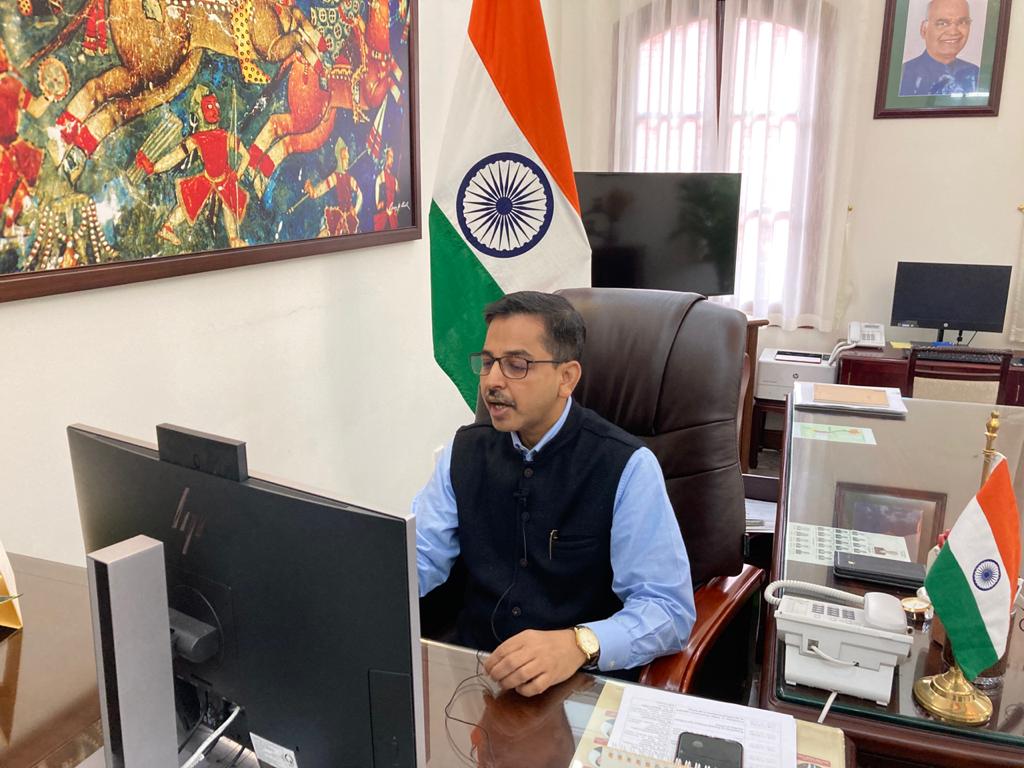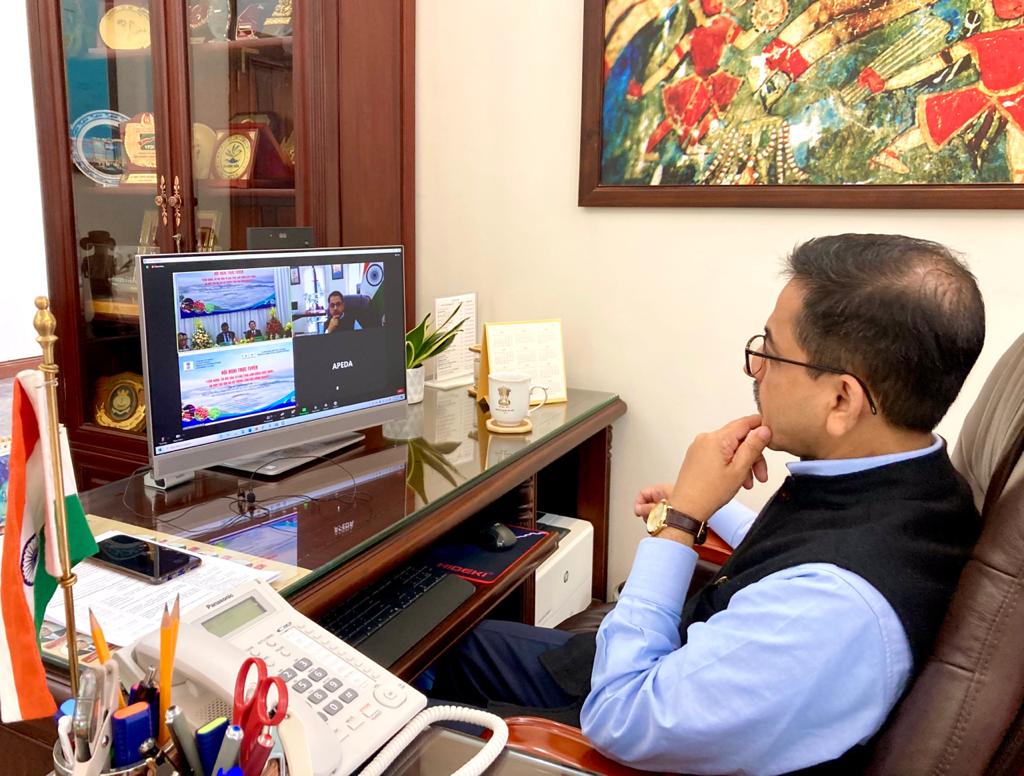
It gives me great pleasure to be joining this webinar. I would like to thank Vice Chairman of Lam Dong Provincial People’s Committee, Mr. Phan Van Da for chairing this session along with our Consul General Dr. Madan Mohan Sethi. I would also thank Chairman of APEDA Dr. M. Angamuthu who is joining us from India along with his team, and also representatives from the Indian Council of Agricultural Research (ICAR), which is our foremost agricultural research institution in India with a long tradition of cooperation with Vietnam.
The subject of today’s webinar – “Cooperation in Smart Agriculture” – is a very relevant one today. I am particularly pleased that we are exploring this subject with Lam Dong province, which is well-known for its strong capabilities in vegetable and fruit farming. It is also a centre for floriculture. As the Vice Chairman mentioned in his remarks, the Flower Festival is a very famous event that Lam Dong province hosts every year.
I fondly recall my own visit to Lam Dong province in October 2019. I had the opportunity to meet at that time the then Chairman of the Provincial People’s Committee. We had a good discussion on ongoing and potential cooperation between India and Lam Dong province and I was told that almost 15% of Lam Dong’s exports were destined to India which is a significant relationship in trade and economic engagement. We also discussed agricultural cooperation, and I had the opportunity to visit some of the large vegetable farms and witness the modern technology and agricultural practices that the farmers in Lam Dong are deploying.
.jpeg)
I also understand that an agricultural delegation from Assam, our North Eastern state, had visited Lam Dong as part of a field visit in May 2018, before I came to Vietnam. I heard about the very good impressions that our delegation carried back with them. They visited some of the pepper and coffee farms as well as greenhouses used for farming of vegetables and flowers. I was reading their report and some of the things they mentioned – such as smart practices being used in Lam Dong’s agriculture – were quite significant; for example, mixed-cropping of coffee and pepper, underground irrigation system for efficient farming, use of hydroponic techniques for farming of vegetables etc.
So, clearly, Lam Dong offers us a valuable platform to raise the level of our bilateral cooperation in agriculture. This webinar is a further testimony to the potential and prospect that exist in our engagement in this important area.
Agriculture, as you would know, has traditionally been an important component of India-Vietnam relations going back to the 1970s, when Government of India supported many initiatives towards transformation of Vietnam’s agriculture. These include some of the iconic projects like the Cuu Long Delta Rice Research Institute which was set up in 1976; the Southern Fruit Research Institute (SOFRI) in Tien Giang province which came up in 1980s, and so on. These are important icons of agricultural cooperation between India and Vietnam, which have played an important role in Vietnam’s agricultural advancement.

I am very happy that agriculture remains an important part of our relationship even today under our Comprehensive Strategic Partnership. Traditionally, there was a time when India was helping Vietnam with its agricultural capabilities and capacities. I think today Vietnam’s agricultural development has reached such high points where there are so many things that India can also learn from Vietnam’s experiences and practices – things like agricultural productivity; integration between lab, farm and industry; development of farming sector for exports, and so on. All these are areas where Vietnam has achieved remarkable success and there are many pointers for us to learn from Vietnam’s practices.
We are having on-going exchanges in many of these areas through a Joint Working Group (JWG) on agriculture. It is a bilateral mechanism where our agricultural officials, scientists and researchers jointly discuss best practices and potential cooperation. We had the first meeting of this JWG in 2019 and there was a very good feedback on the discussions that they held. Based on those discussions, we have been able to chart out some areas where we are looking at priority cooperation with Vietnam in the agriculture sector. These include areas like cooperation in biotechnology, post-harvest technology, agricultural mechanisation, hi-tech and clean agriculture.
Further, during the Virtual Summit that our two Prime Ministers held in December 2020, the Joint Vision for Peace, Prosperity and People that they adopted specifically identifies closer cooperation in agriculture, particularly in sustainable agriculture, as a focus area. This is also to effectively adapt our agricultural practices and technologies to the impacts of climate change which is ubiquitous. Clearly, in our two countries, which are among the most vulnerable to climate change, adapting our agricultural practices and techniques to the vagaries of climate change is an urgent requirement. And I am sure that there are many things that we can exchange in this regard and learn from each other.
.jpeg)
Investment in each other’s agricultural sector is yet another important dimension of our engagement. As I mentioned, there is great potential today for Vietnam to contribute to India’s agricultural development. We welcome investments in India from Vietnam in areas like agro-processing, marine products, woodwork, and bamboo and forestry products. Lam Dong can play an important role on this front.
As both India and Vietnam, despite their economic development and aspirations to become industrial economies, continue to depend on agriculture as a significant pillar of their economic strength, this is a natural area of closer engagement for us. India is celebrating its 75th anniversary of Independence beginning this year. Vietnam celebrated that landmark two years ago. Both our countries have progressed in the last 75 years of their existence as modern nations, moving from primitive agricultural practices to modern technology-driven agriculture. In India, we are endeavouring to undertake significant initiatives to unleash the potential that exists for making agriculture a highly productive driver of our economy. One of our primary national tasks is to raise the incomes of our farmers because a large segment of our population still depends on agriculture.
All these factors create grounds with huge potential for our cooperation.
I am happy that ICAR and APEDA are joining these discussions today. They are among the premier stakeholders in India with interest in ensuring that our agricultural cooperation leads to fruitful and mutually beneficial outcomes for both sides. I would urge them to use today’s webinar as a starting point for deeper engagement with provinces of Vietnam who on the Vietnamese side are important stakeholders for sectoral engagement, particularly in areas like agriculture. There is added significance that a province like Lam Dong, which has its own strengths in agriculture, is hosting this webinar. I hope that today’s discussions will reflect on many existing opportunities and pave the way for new ones.
I would also like to assure that from the Embassy and Consulate General of India, we will be happy to extend whatever facilitation, whatever assistance, you may require in following up on the outcomes of your discussions today. I wish you all a very fruitful and engaging discussion and a very productive exchange of views.
Thank you once again for your attention.
***




.jpeg)

.jpeg)






















